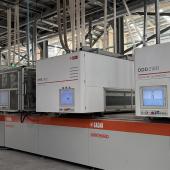Bedeschi strengthens its position in Iran with construction of the Azharshal plant

One of the heavy clay machinery manufacturers to have been operating longest in Iran is Bedeschi, which is continuing to strengthen its position in this market in response to the need for more modern technologies.
The company’s operations in Iran date back to 1956 when chairman Guglielmo Bedeschi began collaborating with the Tehran Public Administration to perform maintenance work on existing brick factories. Over the following years it built plants in various areas of the country. After the 1979 revolution, in cooperation with the Housing Foundation (a section of the Ministry of Public Works and Transport of the Tehran Public Administration), a programme was launched to renovate and mechanise the brickworks located in the Tehran region. The aim was to reduce pollution and address the problem of child labour in the industry. The type of plant adopted in that period used Hoffman kilns, which ran on highly polluting fuels such as heavy oil and made intensive use of unskilled labour in all stages of the production process.
Over the following years Bedeschi continued to be involved in a number of projects in the heavy clay, mining and cement industries.
After the sharp decline in trade that began in 2012 and continued for several years, the country’s technological development slowed considerably and commercial relations with European countries slackened. Following the lifting of sanctions and the signing of international agreements in early 2016, the Iran market has resumed its growth and now offers plenty of opportunities.
One example is the recent contract signed between Bedeschi and Hoonam Sofal, a historic brick manufacturer operating under the Azharshal brand name which is based 200 km from Teheran and is owned by the Zanguie family.
The contract involves the supply of a modern turnkey plant which is currently under construction and will have a production capacity of 600 tons/day. The plant uses cutting-edge technologies to achieve outstanding flexibility. Clay preparation is performed using a storage silo with automatic extraction, while the semi-continuous drying and tunnel kiln firing processes are controlled by a computerised system. All loading and unloading operations are performed fully automatically by highly efficient robots. A teleservice programme allows for remote monitoring by Bedeschi service personnel, who can provide just-in-time assistance with any problem.
Did you find this article useful?
Join the CWW community to receive the most important news from the global ceramic industry every two weeks




















